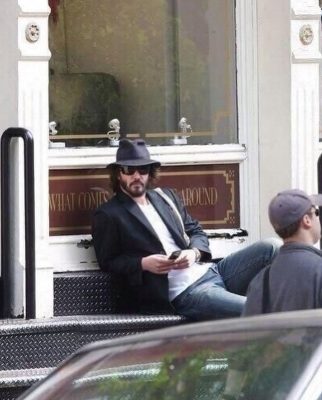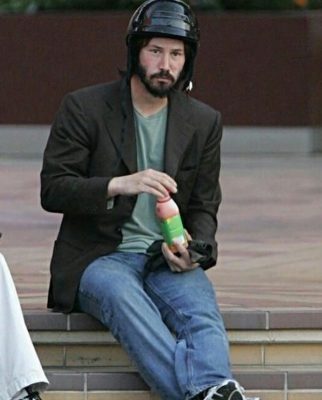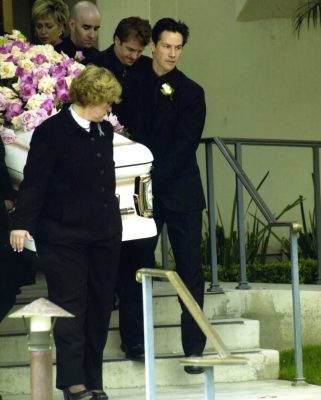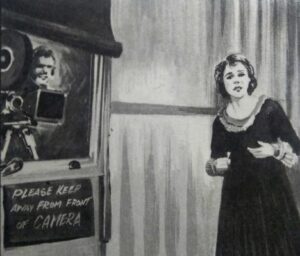 Pin
Pin Image by Keanu Reeves Media
Most Hollywood stars flaunt their wealth like peacocks showing off their feathers. Private jets, diamond-studded watches, sprawling mansions that could house small villages. Then there’s Keanu Reeves—a man worth hundreds of millions who rides the subway, wears the same jacket for decades, and gives away more money than most people will ever see.
His approach to wealth feels almost alien in Tinseltown. While other celebrities collect sports cars like trading cards, Keanu quietly funds children’s hospitals. When The Matrix sequels made him richer than small countries, he handed most of it to the special effects and costume teams. “Money doesn’t mean anything to me,” he once said, and somehow, you believe him completely.
What makes his story even more remarkable is how tragedy shaped his generosity. Loss taught him that material things fade, but kindness echoes forever. His keanu reeves net worth might shock you, but how he spends it will restore your faith in humanity. This isn’t just about dollars and cents—it’s about a man who turned pain into purpose, wealth into healing.
Table of Contents
The Numbers Behind the Kindness
 Pin
Pin Image by Keanu Reeves Media
When you dig into Keanu Reeves’ finances, the figures are staggering. Conservative estimates put his wealth around $380 million, though some industry insiders whisper it could be closer to $400 million. The bulk came from The Matrix trilogy, where his backend deals and profit-sharing agreements turned him into one of Hollywood’s highest-paid actors. His base salary for the sequels was $15 million each, but the real magic happened with his 10-15% share of the box office gross.
But here’s where Keanu breaks every Hollywood rule: he doesn’t hoard it. After The Matrix Reloaded and Revolutions wrapped, he did something unprecedented. He gave away roughly \$75 million of his earnings to the special effects and costume design teams—people who rarely see big bonuses despite making movies possible. One stuntman received enough to buy a house. A costume designer could finally send her kids to college. These weren’t publicity stunts or tax write-offs. They were quiet acts of recognition that success belongs to everyone who creates it.
The Matrix Money That Changed Everything
 Pin
Pin Image by Keanu Reeves Media
Before The Matrix, Keanu was comfortable but not wealthy by Hollywood standards. He’d earned steady paychecks from Speed, Point Break, and Bill & Ted, but nothing that screamed “mega-rich movie star.” Then 1999 arrived, and everything shifted. The Wachowski sisters offered him something unusual: a smaller upfront fee in exchange for a piece of the profits. Most agents would have laughed at the deal, but Keanu trusted his gut.
That gamble paid off spectacularly. The Matrix earned \$467 million worldwide, and suddenly Keanu wasn’t just an actor—he was a business partner. When the sequels got greenlit, his negotiating power soared. He secured deals that would make most CEOs weep with envy: $15 million base salary per film, plus 10-15% of gross receipts. The Matrix Reloaded alone pulled in $742 million globally. Do the math, and you’ll understand why his bank account exploded overnight. Yet even as the zeros multiplied, his lifestyle stayed remarkably unchanged. Same modest apartment, same daily subway rides, same worn leather jacket that became his signature.
John Wick's Payday and Career Renaissance
 Pin
Pin Image by Keanu Reeves Media
Just when Hollywood thought Keanu might fade into comfortable semi-retirement, John Wick arrived like a thunderbolt in 2014. The revenge thriller, made on a modest $20 million budget, earned $86 million worldwide and reminded everyone why Keanu Reeves remains box office gold. But more importantly, it launched a franchise that would add serious digits to his wealth while proving that actors over 50 can still kick serious butt.
The John Wick series became Keanu’s second financial windfall. Each film earned progressively more—Chapter 2 pulled in $174 million, Chapter 3 hit $327 million, and Chapter 4 crossed $440 million globally. His per-film salary reportedly climbed from $1-2 million for the original to $15 million for Chapter 4, plus backend participation. The franchise revitalized his career and bank account simultaneously. Yet true to form, Keanu celebrated these successes quietly. No flashy parties or social media bragging. Just a man grateful for second chances, treating his stunt teams to expensive dinners and continuing his tradition of sharing success with those who help create it.
The Art of Living Simply Despite Millions
 Pin
Pin Image by Keanu Reeves Media
Walk through Beverly Hills, and you’ll spot mansions that scream “movie star lives here!” But Keanu Reeves chose differently. For years, he lived in a modest Hollywood Hills home worth around $5 million—pocket change for someone of his wealth. No sprawling estate, no army of staff, no gold-plated anything. His neighbors often spotted him reading on his front steps or tinkering with his motorcycles in the driveway, looking more like a friendly professor than a global superstar.
His daily routine feels refreshingly normal. He rides public transportation, shops at regular grocery stores, and eats at neighborhood diners where nobody makes a fuss. When paparazzi catch him on the subway, he’s usually offering his seat to someone who needs it more. His wardrobe consists mainly of black jeans, boots, and that famous leather jacket he’s worn for over two decades. Friends say he drives the same cars for years, maintains genuine friendships with non-famous people, and finds joy in simple pleasures like long motorcycle rides and quiet conversations. It’s as if having money taught him what really matters—and it isn’t stuff.
How Life's Hardships Shaped His Generosity
 Pin
Pin Image by Keanu Reeves Media
Behind Keanu’s wealth lies a story carved by heartbreak that would devastate most people. His father abandoned the family when Keanu was just three, leaving scars that never fully healed. They moved constantly—Hawaii, Australia, New York—never staying anywhere long enough to feel like home. As a teenager, he struggled with dyslexia and dropped out of high school, feeling like he didn’t fit anywhere. These early wounds taught him that stability isn’t guaranteed and success shouldn’t be taken for granted.
The deeper tragedies came later. In 1993, his closest friend River Phoenix died of a drug overdose outside a nightclub, leaving Keanu shattered. Then in 1999, just as The Matrix was making him rich and famous, his daughter with girlfriend Jennifer Syme was stillborn. Eighteen months later, Jennifer herself died in a car crash. These losses could have made him bitter or reckless, but instead they made him softer. He learned that money can’t buy back people you love, can’t heal the deepest wounds, but it can ease others’ suffering. His generosity flows directly from his pain—a man who knows loss intimately, determined to help others avoid it when possible.
The Motorcycle Collection Worth Millions
While Keanu lives modestly in most areas, he has one spectacular indulgence: motorcycles. His garage houses a collection that could make seasoned bikers weep with envy. Custom Harleys, vintage Nortons, sleek Ducatis—each bike representing years of careful hunting and substantial investment. Conservative estimates put his collection’s value around \$3-5 million, but for Keanu, it’s never been about the money. These machines represent freedom, craftsmanship, and the pure joy of engineering perfection.
His passion runs so deep that he co-founded Arch Motorcycle Company with builder Gard Hollinger. Their custom bikes sell for \$78,000 to \$100,000 each, handcrafted pieces of art that happen to have engines. Keanu doesn’t just slap his name on the brand—he works in the shop, tests prototypes, and genuinely understands every bolt and wire. When he rides through California’s canyon roads, helmet on and world forgotten, you see him at his happiest. These aren’t status symbols gathering dust in climate-controlled garages. They’re tools for adventure, reminders that wealth should fuel passion, not replace it. His fellow riders say he’s generous here too, often buying rounds for entire motorcycle clubs and treating mechanics like family.
Real Estate Choices That Surprise Everyone
When you’re worth hundreds of millions, real estate agents expect you to buy the biggest, flashiest properties available. Keanu consistently disappoints them. His primary residence in the Hollywood Hills is elegant but understated—a far cry from the sprawling compounds his peers collect like trophies. The house, valued around $8-10 million, sits on a modest lot with clean lines and mountain views, but no infinity pools or gold-plated anything that screams “movie star mansion.”
What’s more telling is what he doesn’t own. No vacation homes in the Hamptons, no ski chalets in Aspen, no private islands in the Caribbean. Friends say he prefers renting when he travels, enjoying the flexibility to explore without being tied down by property management headaches. When he does invest in real estate, it’s often to help others—quietly purchasing homes for family members or close friends who need stability. His approach reflects his core philosophy: own what you need, share what you can, and don’t let possessions own you. It’s a refreshing perspective in a town where square footage often measures self-worth.
How He Treats Money Like a Tool, Not a Trophy
Most wealthy people obsess over investment portfolios, stock options, and growing their fortunes. Keanu treats money like a well-maintained wrench—useful when you need it, forgotten when you don’t. He’s never been spotted at high-stakes poker games or exclusive investment seminars. Instead, financial advisors handle the boring stuff while he focuses on what matters: good work, genuine relationships, and helping others when opportunities arise.
His spending habits reveal this philosophy beautifully. He’ll drop serious cash on a perfectly crafted motorcycle or fund a friend’s medical bills without blinking, but he’s been photographed wearing the same basic clothes for years. Quality matters more than quantity, substance trumps flash every time. When John Wick producers offered him a percentage deal instead of a higher upfront salary, he took it—not because he needed more money, but because he believed in the project. That confidence paid off spectacularly, but the gamble shows how he views wealth: as fuel for creativity and connection, not as an end goal. Money gives him freedom to choose interesting projects and help people he cares about, nothing more complicated than that.
The Generous Boss Who Shares Success
Hollywood is notorious for treating crew members like disposable equipment, but Keanu Reeves operates differently. On every film set, he’s known for extraordinary generosity toward the people who make movie magic happen behind the cameras. During The Matrix sequels, he didn’t just keep his massive paychecks—he distributed millions among stunt coordinators, special effects artists, and costume designers who rarely see profit participation. One stuntman reportedly received enough to buy his first house.
His reputation for kindness extends beyond big payouts. He regularly brings expensive lunches for entire crews, remembers everyone’s names from the director to the craft services team, and treats each person with genuine respect. When Constantine wrapped filming, he gave personalized Harley-Davidson motorcycles to his entire stunt team. For The Replacements, he bought custom-made Rolex watches for the stunt crew. These aren’t calculated moves for good publicity—cameras rarely capture these moments. Cast and crew members describe working with Keanu as transformative, not because he’s famous, but because he makes everyone feel valued. His generosity creates loyalty that money can’t buy and friendships that last decades beyond any single project.
Investment Wisdom and Financial Philosophy
Unlike many celebrities who chase flashy ventures or risky startups, Keanu’s investment approach mirrors his personality—steady, thoughtful, and focused on long-term value. His financial portfolio reportedly includes conservative stock investments, bonds, and real estate holdings that generate consistent returns without wild speculation. He’s never been linked to cryptocurrency crashes, restaurant chain failures, or other celebrity investment disasters that make headlines.
His smartest financial move might be his involvement with Arch Motorcycle Company. Rather than simply lending his name to existing products, he invested time, money, and genuine passion into building something meaningful. The company has grown steadily, selling premium motorcycles to discerning collectors worldwide. When asked about money management, Keanu keeps it simple: “I don’t need to be the richest guy in the cemetery.” His financial advisors handle the complex stuff while he focuses on projects that fulfill him creatively and personally. This hands-off approach has served him well—his wealth continues growing even as he gives substantial amounts away, proving that sometimes the best investment strategy is hiring good people and not overthinking every decision.
Lessons from Hollywood's Most Humble Millionaire
Keanu Reeves proves that wealth doesn’t have to change who you are—it can amplify the best parts instead. His approach to money offers masterclasses in living authentically while financially successful. He shows us that true security comes not from hoarding wealth, but from maintaining the relationships and values that matter most. His generosity isn’t reckless spending; it’s strategic kindness that creates lasting impact in people’s lives.
Perhaps most importantly, Keanu demonstrates that happiness and money operate on different scales entirely. He could afford any luxury imaginable, yet finds joy in simple pleasures: a good book, a long motorcycle ride, genuine conversations with friends. His wealth enables choices—choosing meaningful projects over profitable ones, choosing to help others over helping himself, choosing authenticity over image management. In a culture obsessed with accumulating more, Keanu quietly shows us what enough actually looks like. His story reminds us that the richest people aren’t those with the biggest bank accounts, but those who use whatever they have—whether it’s millions or modest means—to make the world a little kinder.
FAQs
He earned approximately $250-300 million total, including his backend deals and profit-sharing agreements from all three films.
Yes, he’s donated an estimated $100+ million to cancer research, hospitals, and film crews throughout his career.
His custom motorcycle collection, valued around $3-5 million, though he also co-founded Arch Motorcycle Company.
He believes money should serve life, not control it. His tragedies taught him that relationships matter more than possessions.
His salary reportedly grew from $1-2 million for the first film to $15 million for Chapter 4, plus backend participation.































